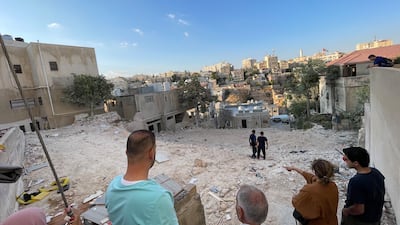King Abdullah will pay for new apartments for victims of a building collapse last month in Amman that killed 14 people, the Jordanian government has announced.
Meanwhile, court proceedings appeared to support accounts by residents who said expansion work caused the structure to come down.
The September 13 collapse of the building in the middle-class Al Weibdeh district in central Amman was the deadliest such incident in Jordan in decades.
It underscored a lack of enforcement of building codes and safety regulations in the country of 10 million people.
The incident occurred on the day King Abdullah travelled to Paris on an official visit to France.
The Ministry of Social Affairs said in a statement on Saturday that “through the generosity of his majesty” it will buy new apartments for five of the families who lived in the collapsed building at a cost of $70,000 each.
The five-storey building had six apartments, including one on the ground floor which was being expanded by the building's owner, according to residents and neighbours. The authorities initially said it was a four-storey building.
The owner and two other men have been put on trial. They were charged with 14 counts of “causing death”. One of the two men is an Egyptian labourer and the third is of unknown nationality and was linked to the work.
The official Jordanian news agency said on Sunday a report by court-appointed experts concluded that work on the ground floor apartment, which included removal of a retaining wall, brought down the building.
It quoted one of the experts who wrote the report as telling the court that the decades-old building had cracks but that on September 13 “as soon as the middle column was removed on the ground level the building totally collapsed”.
The conclusion was reached after taking samples from the structure and recreating possible collapse scenarios, he said.
A baby was among the 14 people who died in the collapse. Government engineers who were at the scene a day later said the collapse was consistent with a retaining wall having been removed at ground level.
Ahmad Ramadan, a personal trainer who lived in the building with his wife, said occupants of all five apartments or people representing the deceased among them had sued the building owner for damages.
Mr Ramadan was washing his car just outside the building at the time of the collapse. His wife emerged unscathed minutes later through an opening in the rubble.
All three defendants have been released on bail after one month in detention, but they are barred from leaving Jordan until the end of the trial, Mr Ramadan said.
“I don't know how long the court proceedings will take but we are hopeful,” he said. “The building owner has the resources to compensate us.”


